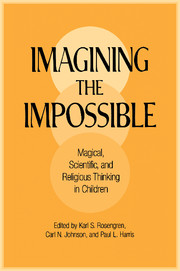Book contents
- Frontmatter
- Contents
- Contributors
- Acknowledgments
- Preface
- 1 The Makings of the Magical Mind: The Nature and Function of Sympathetic Magical Thinking
- 2 Phenomenalistic Perception and Rational Understanding in the Mind of an Individual: A Fight for Dominance
- 3 Metamorphosis and Magic: The Development of Children's Thinking About Possible Events and Plausible Mechanisms
- 4 The Development of Beliefs About Direct Mental-Physical Causality in Imagination, Magic, and Religion
- 5 Intuitive Ontology and Cultural Input in the Acquisition of Religious Concepts
- 6 On Not Falling Down to Earth: Children's Metaphysical Questions
- 7 Putting Different Things Together: The Development of Metaphysical Thinking
- 8 Versions of Personal Storytelling/Versions of Experience: Genres as Tools for Creating Alternate Realities
- 9 The Influence of Religious Beliefs on Parental Attitudes About Children's Fantasy Behavior
- 10 Religion, Culture, and Beliefs About Reality in Moral Reasoning
- 11 Beyond Scopes: Why Creationism Is Here to Stay
- 12 Knowledge Change in Response to Data in Science, Religion, and Magic
- 13 Theology and Physical Science: A Story of Developmental Influence at the Boundaries
- Index
1 - The Makings of the Magical Mind: The Nature and Function of Sympathetic Magical Thinking
Published online by Cambridge University Press: 07 September 2010
- Frontmatter
- Contents
- Contributors
- Acknowledgments
- Preface
- 1 The Makings of the Magical Mind: The Nature and Function of Sympathetic Magical Thinking
- 2 Phenomenalistic Perception and Rational Understanding in the Mind of an Individual: A Fight for Dominance
- 3 Metamorphosis and Magic: The Development of Children's Thinking About Possible Events and Plausible Mechanisms
- 4 The Development of Beliefs About Direct Mental-Physical Causality in Imagination, Magic, and Religion
- 5 Intuitive Ontology and Cultural Input in the Acquisition of Religious Concepts
- 6 On Not Falling Down to Earth: Children's Metaphysical Questions
- 7 Putting Different Things Together: The Development of Metaphysical Thinking
- 8 Versions of Personal Storytelling/Versions of Experience: Genres as Tools for Creating Alternate Realities
- 9 The Influence of Religious Beliefs on Parental Attitudes About Children's Fantasy Behavior
- 10 Religion, Culture, and Beliefs About Reality in Moral Reasoning
- 11 Beyond Scopes: Why Creationism Is Here to Stay
- 12 Knowledge Change in Response to Data in Science, Religion, and Magic
- 13 Theology and Physical Science: A Story of Developmental Influence at the Boundaries
- Index
Summary
Although the word magic is common in both scholarly and lay discourse, the variety of things to which it refers is far-reaching, ranging from a social institution characteristic of traditional societies, to sleight-of-hand or parlor tricks, to belief in unconventional phenomena such as UFOs and ESP, to sloppy thinking or false beliefs, and even to a state of romance, wonder, or the mysterious. One must at least entertain the possibility that there is no true category here at all. Instead, the term “magic” in current usage has become a label for a residual category – a garbage bin filled with various odds and ends that we do not otherwise know what to do with.
Yet to relegate “magic” to this status seems to us to be throwing out the baby with the bath water. Certain meaningful consistencies can be gleaned from a careful review of the historical and current approaches to magic, including our own recent empirical studies of “magical thinking.” We turn now to a review of these approaches, with an eye toward outlining a working definition of magic. This is followed by a review of our empirical studies to date and some speculations, based on current thinking in diverse fields, regarding the origins, functions, and implications of magical thinking.
- Type
- Chapter
- Information
- Imagining the ImpossibleMagical, Scientific, and Religious Thinking in Children, pp. 1 - 34Publisher: Cambridge University PressPrint publication year: 2000
- 91
- Cited by



